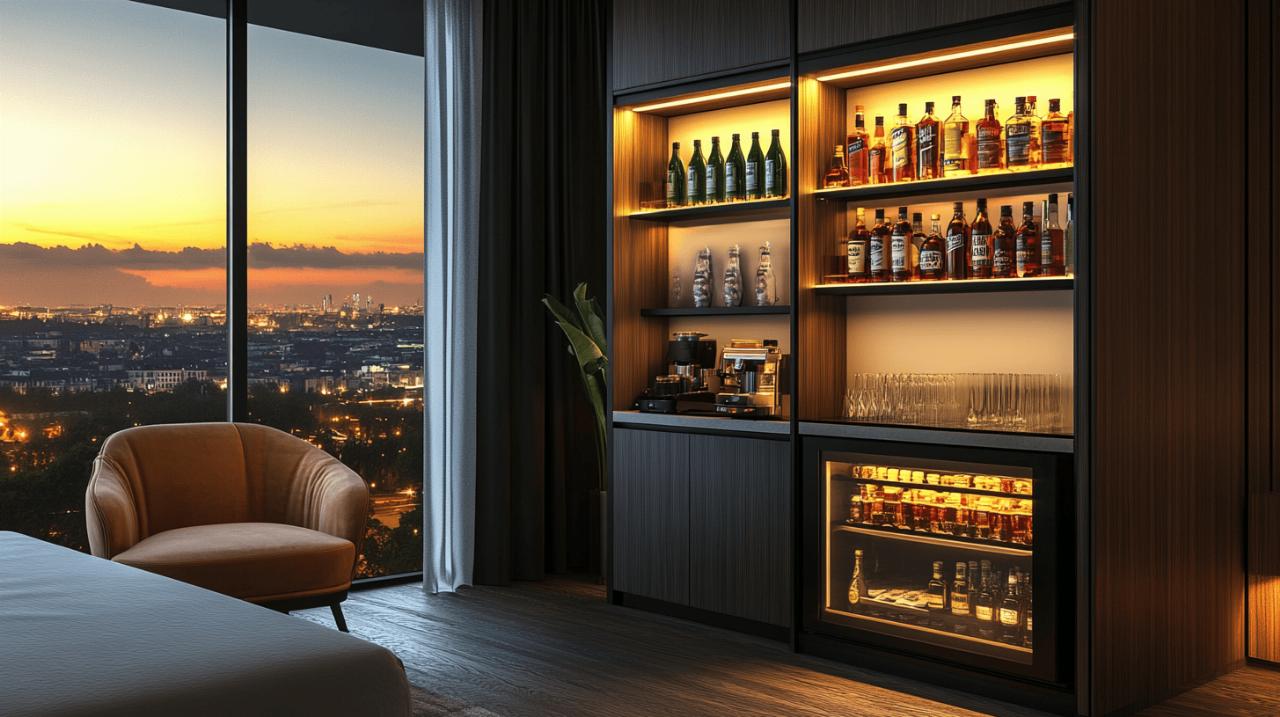Hotel mini bars have transformed dramatically since their debut at the Hong Kong Hilton in 1974, where they sparked a remarkable 500% increase in room drink sales. From their inception as premium amenities to their current status, these convenient in-room refreshment stations reflect the changing dynamics of hospitality services.
Modern mini bar trends in hotels
The mini bar landscape has undergone significant changes, driven by guest preferences and industry innovations. While these once-standard room features saw a 28% decline in sales between 2007 and 2012, recent developments signal fresh approaches to this classic amenity.
Shifting from traditional paid models
Mini bars once represented just 0.4% of hotel food and beverage revenue by 2017. Hotels faced challenges with labor-intensive maintenance and guest dissatisfaction over high markups. This led many establishments to explore alternative solutions, including on-premises convenience stores and technology-driven inventory management.
Rising popularity of complimentary offerings
The hospitality industry now embraces new mini bar concepts focused on personalization and value. Modern travelers seek wellness options and local flavors, prompting hotels to stock curated selections of premium British products, artisanal items, and sustainable offerings. Some properties now feature 'honesty bars' with expanded product ranges, while others integrate eco-friendly packaging and ethically sourced items.
Benefits of free mini bar services
Since their inception at the Hong Kong Hilton in 1974, mini bars have evolved from a groundbreaking luxury amenity to a standard hotel feature. While traditional paid mini bars witnessed a 28% sales decline between 2007 and 2012, the free mini bar model presents distinctive advantages in today's hospitality landscape.
Guest satisfaction and loyalty impact
Modern travelers value personalization and convenience in their hotel experience. Free mini bars stocked with premium offerings, local products, and sustainable options create positive guest experiences. Hotels implementing complimentary mini bar services notice enhanced customer satisfaction, particularly among families and sports teams who appreciate readily available refreshments. This approach eliminates the traditional pain point of high markups that historically led to guest dissatisfaction.
Marketing advantage for hotels
Free mini bar services represent a strategic marketing tool for hotels. By incorporating eco-friendly packaging, ethically sourced products, and local artisanal items, hotels demonstrate their commitment to sustainability and quality. This model aligns with current travel trends, where guests seek unique experiences and value-driven amenities. The integration of smart technology for stock management and customization options further positions hotels as modern, guest-centric establishments. Some properties report triple the engagement with mini bar services compared to pre-2020 figures, suggesting that free mini bars can significantly boost guest interaction and satisfaction rates.
Financial aspects of paid mini bars
Mini bars emerged as a groundbreaking hotel amenity in 1974 when Robert Arnold introduced them at the Hong Kong Hilton. The innovation proved highly successful, with in-room drink sales soaring by 500% and overall sales growing by 5% annually. This remarkable start marked the beginning of a transformative era in hotel room services.
Revenue generation potential
Mini bars historically represented a significant revenue stream for hotels. The Madison Hotel's notable event during the 1987 Washington Summit, where guests spent $1,400 on mini bar alcohol in one night, showcases their profit potential. Yet, market dynamics shifted dramatically between 2007 and 2012, with mini bar sales declining by 28%. By 2017, these units contributed merely 0.4% to hotel food and beverage revenue, while hotel bars and lounges experienced a 4.9% revenue increase.
Operating costs and maintenance
The operational aspects of mini bars present complex challenges for hotels. Staff must manage inventory, handle restocking, and maintain temperature-controlled units. Modern solutions incorporate smart technology for inventory tracking and guest usage monitoring. Hotels now balance traditional offerings with innovative approaches, such as establishing on-premises convenience stores. The pandemic sparked renewed interest in mini bars, with some properties reporting triple the revenue per room compared to pre-2020 figures. Many establishments now focus on premium offerings, local products, and sustainable options to enhance value while managing operational expenses.
Guest preferences and consumption patterns
 The minibar landscape has transformed significantly since its debut at the Hong Kong Hilton in 1974. This innovative service sparked a remarkable 500% increase in room drink sales, setting a new standard for in-room amenities. The changing dynamics of guest behavior and hotel operations have shaped modern minibar services.
The minibar landscape has transformed significantly since its debut at the Hong Kong Hilton in 1974. This innovative service sparked a remarkable 500% increase in room drink sales, setting a new standard for in-room amenities. The changing dynamics of guest behavior and hotel operations have shaped modern minibar services.
Usage rates between free and paid options
The traditional paid minibar model faced challenges, with sales declining 28% between 2007 and 2012. By 2017, minibars generated merely 0.4% of hotel food and beverage revenue. The pandemic brought unexpected changes, with some properties reporting triple the minibar revenue per room compared to pre-2020 figures. Hotels now embrace diverse approaches, from premium paid offerings to complimentary services, adapting to guest preferences and operational efficiency.
Most popular minibar items
Modern minibar selections reflect evolving guest preferences, moving beyond basic snacks and drinks. Hotels like The Wellesley Knightsbridge stock artisanal nuts, organic vegan chocolate, and cold-pressed juices. Local products, wellness options, and sustainable packaging dominate current offerings. Firmdale Hotels exemplifies this trend by featuring premium British products and ready-to-enjoy items, while maintaining 'honesty bars' for expanded selection. This shift toward curated, personalized experiences aligns with guest expectations for quality and sustainability in their hotel stay.
Mini bar management strategies
Since the pioneering introduction of the first hotel mini bar at the Hong Kong Hilton in 1974, these in-room amenities have transformed significantly. The initial success was remarkable, with in-room drinks sales soaring by 500%. Modern mini bars blend luxury, technology, and guest preferences into a refined service model.
Stock rotation and inventory control
Modern hotels implement sophisticated stock management systems to maintain mini bar excellence. Many establishments now use automated tracking technology to monitor consumption patterns and optimize inventory levels. The Wellesley Knightsbridge showcases this evolution by offering premium British products, artisanal nuts, and organic vegan chocolates. This careful product selection reflects current guest preferences while maintaining efficient stock control.
Quality assurance measures
Hotels prioritize quality through strategic partnerships and sustainable practices. Firmdale Hotels demonstrates this commitment by incorporating BELU Water, featuring glass bottles with 40% recycled content. The focus extends beyond product quality to include eco-friendly packaging and ethically sourced ingredients. This approach aligns with guest expectations for premium offerings while maintaining environmental responsibility. Many establishments now integrate technology-driven monitoring systems to ensure consistent product quality and freshness.
Future of hotel mini bar services
Modern hotel mini bars are evolving beyond traditional paid models, adapting to guest expectations and market trends. The dramatic shift in guest behavior, especially since 2020, has sparked innovation in mini bar services, with some properties reporting triple revenue compared to previous years. This transformation reflects a deeper understanding of guest preferences and changing consumption patterns in the hospitality sector.
Smart technology integration
The mini bar landscape is transforming through technological advancement. Hotels now implement sophisticated tracking systems and mobile apps to streamline inventory management and enhance guest convenience. Modern units feature remote monitoring capabilities, automated stock tracking, and integrated payment solutions. These smart systems help properties maintain optimal stock levels while reducing operational costs and improving guest satisfaction through seamless service delivery.
Sustainable practices and eco-friendly options
Hotels are embracing sustainability in their mini bar offerings. The focus has shifted toward recyclable packaging, locally sourced products, and energy-efficient units. Many establishments now stock their mini bars with items in glass bottles containing minimum 40% recycled content, while others opt for RPET bottles made from 100% recycled plastic. Premium British products, artisanal treats, organic vegan chocolates, and cold-pressed juices are becoming standard offerings, reflecting a commitment to quality and environmental responsibility. This eco-conscious approach aligns with guest values while maintaining the convenience and luxury expected from hotel services.
